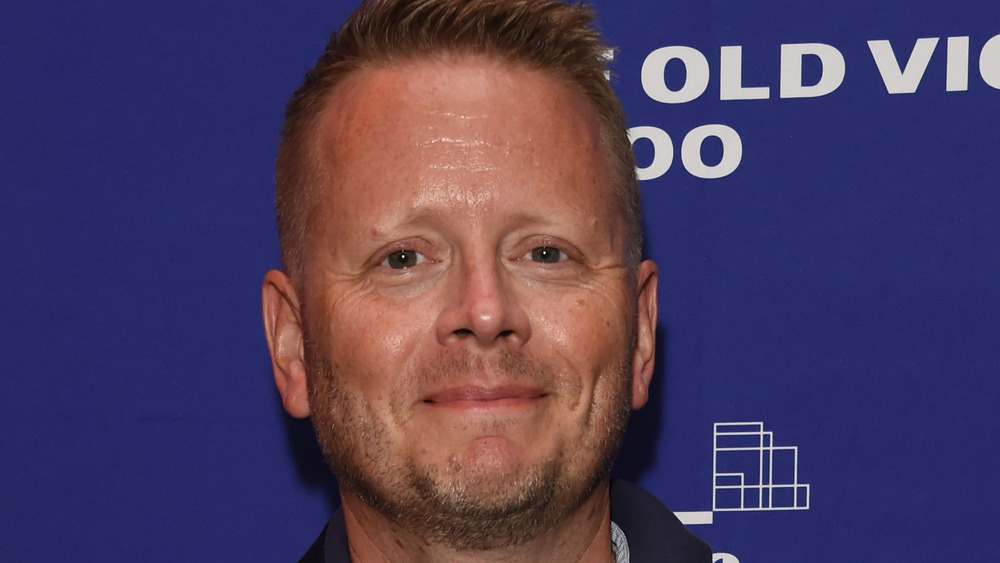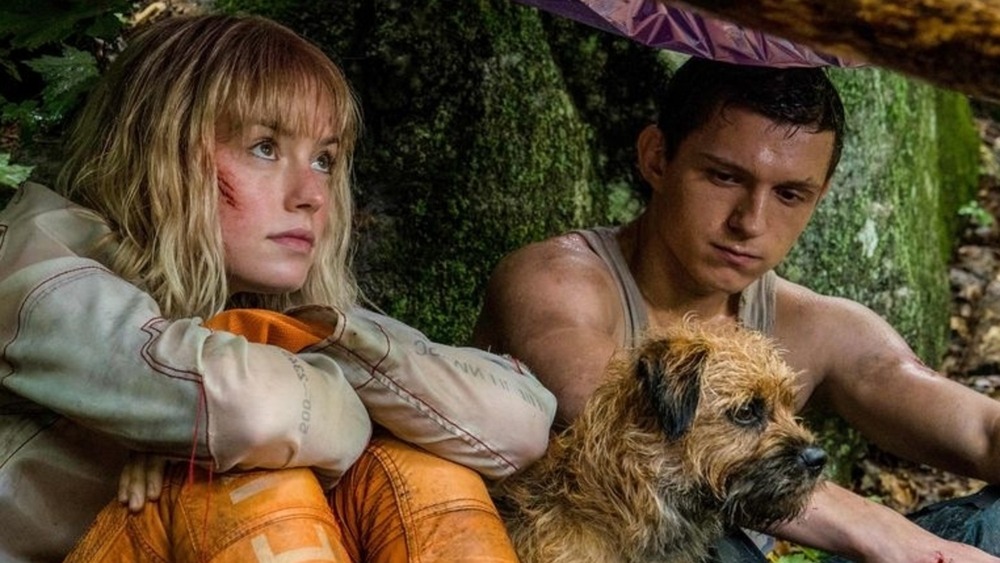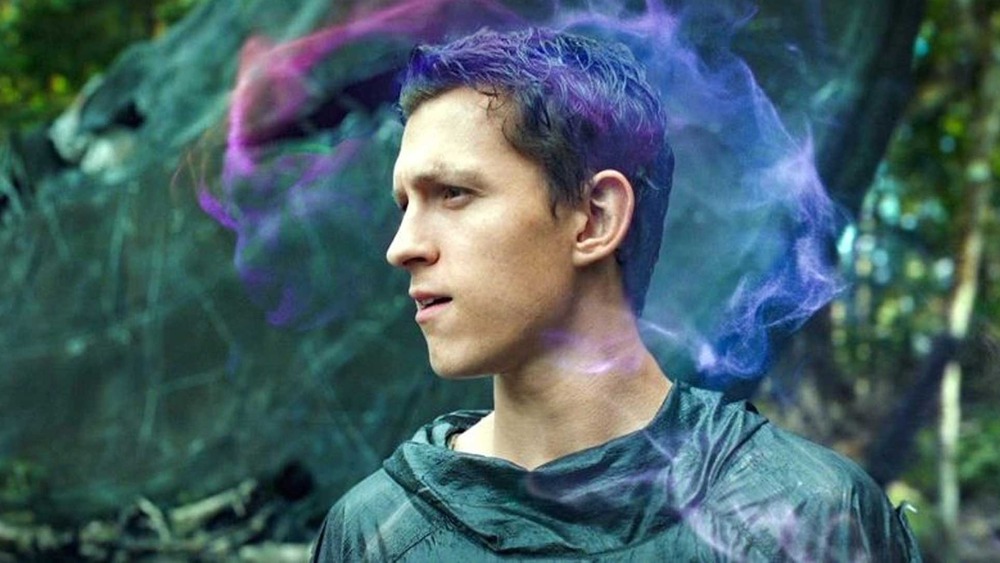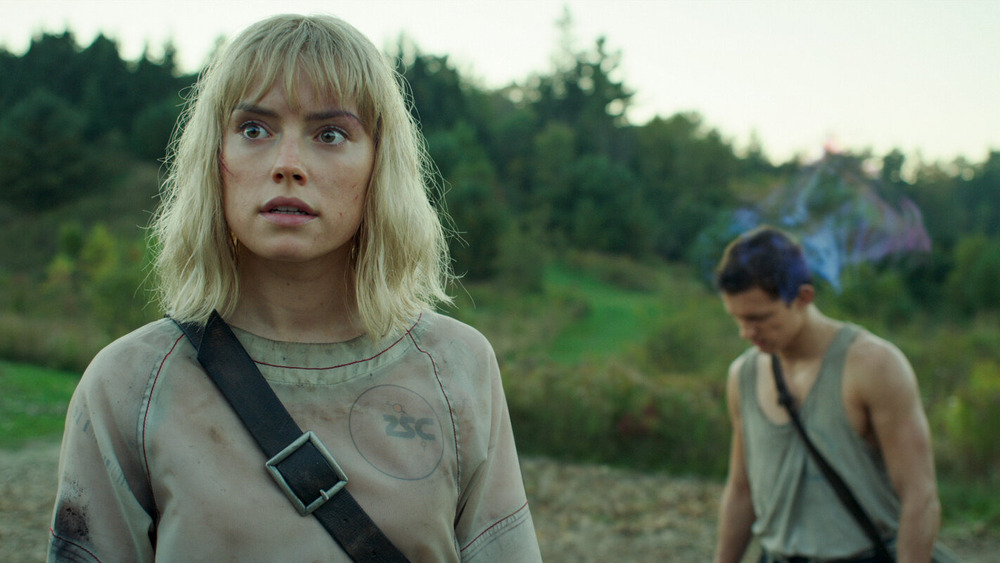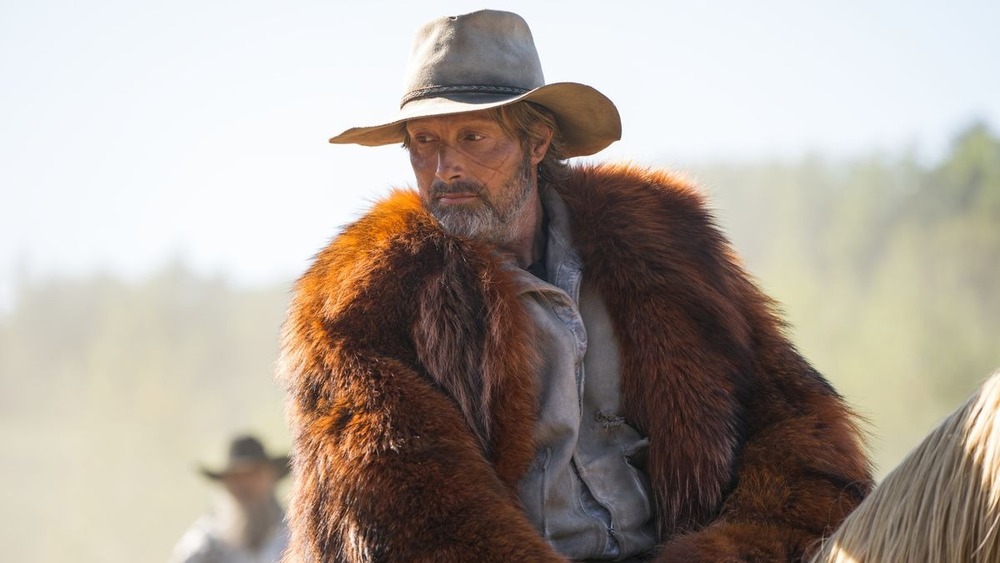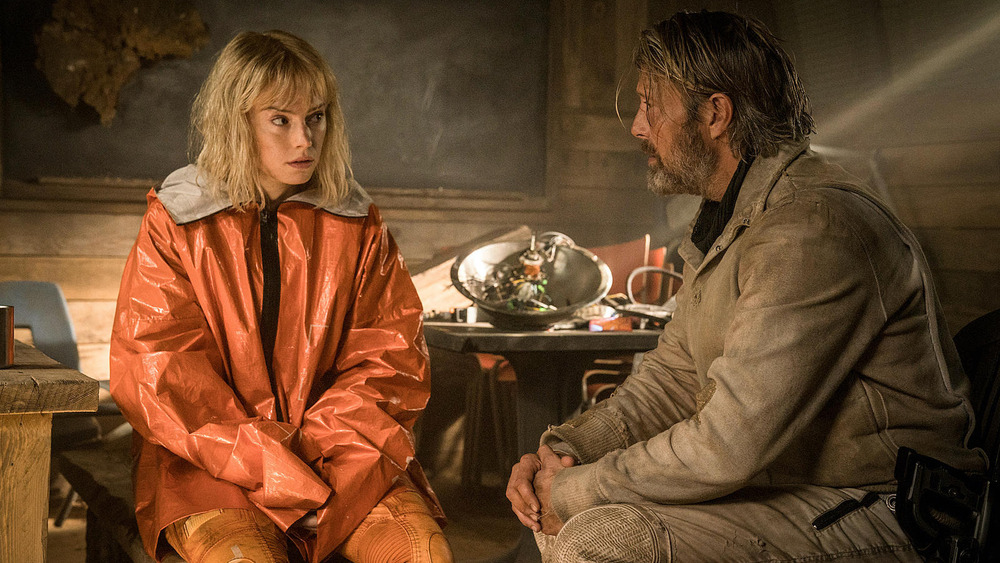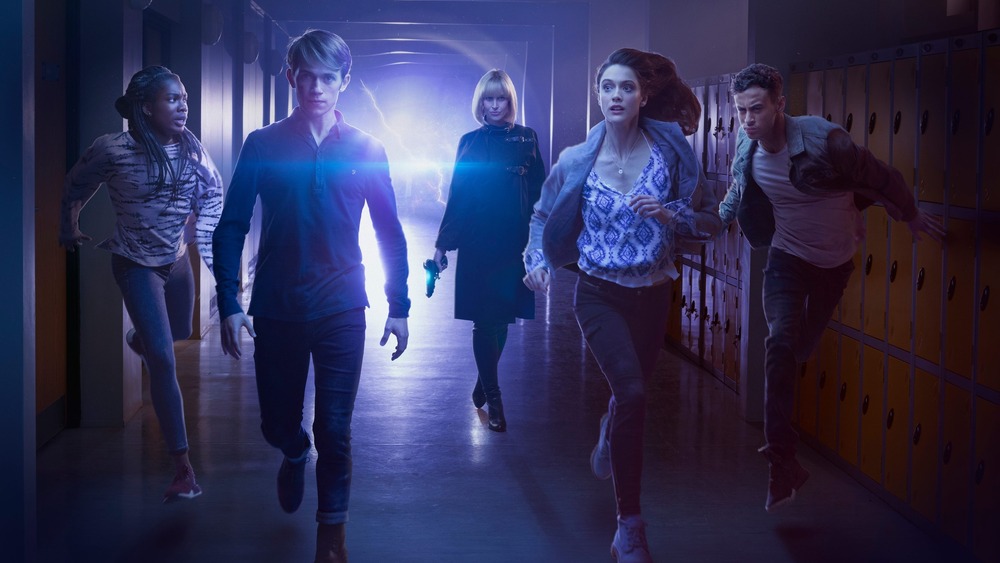Chaos Walking Writer Patrick Ness Sheds Some Light On The Story Behind The Story - Exclusive Interview
In 2008, Patrick Ness' YA story The Knife of Never Letting Go was released into the world to enormous success. Over a decade later Chaos Walking, the film based on what became a series of books, was finally released into a very different sort of world. Chaos Walking is about a planet colonized by humanity. The planet is very Earth-like save for one important distinction — something about this world makes it so that every thought a man has will be broadcast as sound and images unless he does everything in his power to control it. That broadcast, dubbed "noise," plays havoc with human society, especially since it only impacts men and not women, leading to a deeply troubled civilization struggling to keep itself together.
And in the midst of all that is Todd Hewitt (Tom Holland), a young man who was born and raised on this world, a young man who only knows life with the noise. He encounters Viola (Daisy Ridley), a young woman who's part of the next wave of humans to colonize this brave new world.
Chaos Walking is a complicated story that invites big questions, so Looper sat down with author and screenwriter Patrick Ness to get some answers in time for the film's arrival on digital and VOD platforms.
Chaos Walking is about what's happening right now
You wrote the first book Chaos Walking is based on way back in 2008, long before we were living in this trend of stories about terraforming worlds and new Earths. Why do you think there's so much of this happening, this story, where man is going to another planet?
I certainly didn't invent it, but that speaks to steep, philosophical questions about sci-fi and what it does and why it exists. To me, it's always about the reaching. It's always about the questioning of how we're in a difficult place, so how do we get to a new place, even metaphorically. And the analogy is always another planet because it's a possibility to get out of something difficult. And as you know, I'm not saying anything super brilliant here, but science fiction set in the future is always about right now. It's rarely about a real future. It's always about right now. It's written right now. And so honestly, when I was writing it, I was writing about social media for one thing, the increase in noise and loudness and the sharing of opinions. And I thought, "Well, what would you do if you had no choice?" And I thought, "Well, where might this happen?" I thought, "What if you landed in a place that forced you to hear everyone's thoughts?" Which then led to questions of colonialism and would we make the same mistakes with the native peoples that we did in America and Australia? Probably. So for me, it's always about right now. I'm not downplaying the reach of stuff. I love the reach of sci-fi, but the best is really just looking at the world right now and asking probing questions about it.
How the noise would effect trans people
When I watched the movie, I had a question, and it's a big question. Yesterday was the Trans Day of Visibility. This story that you told, you can hear and see the men's thoughts, you can't hear or see the women's thoughts. This is a binary idea, where in the real world, no binary exists. So what happens with trans people? What happens with non-binary people?
Yeah, the books were written 12, 13 years ago and I feel, like I hope most people do, that I know a lot more about trans people and transgender issues than I did then. And I believe that's true and so I'm not going to try to pretend that I was so... I'm not going to pretend that I haven't grown. For example, my niece is transgender and that's been really interesting to see firsthand. I could author fringe transgender. And I have been asked this question, and I think there's a... In His Dark Materials everybody's got a daemon and the daemon is always the opposite sex, except for a few people who have the same sex. And I have always thought that's Philip Pullman telling us that those people are gay, for example.
And then there's a question too, somebody once asked him at an event, I think it was a reader who was disabled, I think with cerebral palsy, and she said, "What do the daemons of disabled people look like? And how do they..." And he said, "You know, I'd never thought about that." And then it shows up in the latest book. And so we're trying to keep up with the world, too, and we're growing too. But I kind of think because I functionally believe in terms of almost binary transgenderism, I believe that transgender men are men and I believe that transgender women are women. So I think that in a world with noise, the noise would be a help with that. The noise would be a suggestion of that. You would think, "Ah, there's a spectrum here." And I think people's noise will be louder or quieter or they might have different colors and might have different ways of controlling it. I think it would just be because gender identity is, I believe, intrinsic, then it would be reflected in your noise. And I'm not just saying that as a stereotypically 2021 woke response, I genuinely think it would be interesting. And I wish that I had known as much as I do now back then. I think it would have been super, super interesting to come across somebody whose noise did not fit the pattern that Todd thinks that it does.
The key to casting Chaos Walking
Let me ask you maybe something a little easier. You wrote these books and then this movie came out and it's got a bonkers cast. Tom Holland, Daisy Ridley, David Oyelowo, Mads Mikkelsen, Nick Jonas, Demián Bichir. It's really unbelievable. It's just a tremendous, tremendous group of actors. And what I wanted to do is kind of go down the line and say, you wrote these books, I'm sure you had a lot of ideas in mind for some of these characters as they exist in the book or sort of exist or don't exist exactly in the original stories. And then maybe you were surprised by how these performers sort of brought elements out that maybe you had not thought of, because that's the great thing about a good actor. So can we talk about Tom Holland and what he did with Todd Hewitt?
It's interesting because, going off the transgender question, there was another consideration when I was writing the books. My family is very, very, very multi-racial. And so I wanted to be sure that everybody could see themselves in the book. So for the first book, I purposely didn't refer to people's race because I thought this is something Todd might not mention. And I also wanted any reader to feel like they could invite themselves in. It turns out that has the opposite effect, because when the writer looks like me, people think that all the characters are going to look like me, unless I say otherwise. And that was interesting to me. So I changed it for the rest of the books.
So when it came to casting, I said, "Look, my mind is wide open." I go to the theater a lot. Theater does a lot of colorblind casting, which is a really lousy phrase, but they do. So I said "Just throw cool people at the movie." And so our casting directors were — Jesus, I mean, just the idea of Cynthia Erivo, I thought that's such a cool idea. And David Oyelowo is the villain. I thought that's such a cool idea. And so they just kept bringing it. And some people like Tom and Daisy as well. I think the secret to their kind of stardom is an approachability. It's not an untouchable kind of fame. I think that's the whole point of Peter Parker, it's the whole point of Rey, is that they are these normal people who have just been thrust into something bigger. And so I think that the best YA and the best sci-fi invite people in. And I think that's what Tom and Daisy can do. Particularly Tom, because he's just so freaking charming. So I was just thrilled that they're perfect too.
How Tom Holland and Mads Mikkelsen add to the story
Is there anything that you ended up seeing in the performances that really jumped out at you? Like something that Tom, or Daisy, or David Oyelowo, or anybody did where you were like, "That's incredible."
Yeah. Tom and Daisy are both funny. Tom is hilarious. And that is a much bigger part of their performance than it is in the books. I hope the books are a bit funny. But there's one scene, it isn't in the books, where they're sheltering under the rain and Todd imagines something and it's kind of embarrassing. And that to me is sort of a perfect teenage embarrassment. And I love that and I love the way they play it and I loved the way Daisy plays it. So yeah. It's that kind of... the humor I really, really loved.
Mads Mikkelsen. I want to talk about him too. Just because, again, the mayor is a scary guy in the books, no doubt. Because of the type of control that he has, that a lot of other people don't. Mads Mikkelsen is... I think he has a real gift for being that guy. You can almost relate with him, but also he's scary as hell and definitely evil. And that's what I got off of the performance. But what did you get off of that? What do you think he brought out in the mayor?
He never raises his voice and I think that's the real amazing scare power of an actor like Mads Mikkelsen, who can use stillness to make you watch him. It's like Anthony Hopkins in a way. It's all about stillness, and your eye goes right to him. And the mayor is a character who is terrifying because of his certainty in himself, he doesn't need to raise his voice. He's a hundred percent certain he's right. He's a hundred percent certain you're going to do what he wants you to do. And that's terrifying, because you can't negotiate with it. And those are the scariest kind of leaders. The kind of leaders who lack introspection, but who believe in what they're doing. I think that is his particular kind of charisma and that face, that great movie face. Yeah. Yeah. He's great, Mads. Nice, really nice guy too.
What the noise is actually about
This movie just invites big questions, so it's very hard not to ask them. So much of the noise, to me, reads as sort of a conversation about toxic masculinity. What were you thinking, then, as far as that's concerned now, and how do you sort of feel it's... I think it's even more relevant now in 2021 than it was in 2008, it's only become a larger topic and the more you talk about something, the bigger you realize it is. But I'm interested in your perception on that perspective.
Yeah. I think the worst thing we do as human beings is our treatment of difference. We never regard it as simply equal. We either regard it as something less than us, so we can step on it, or better than us, so we need to tear it down. So it's constant conflict. It's constant conflict. You look at war. Wars like Northern Ireland where people look exactly the same, have exactly the same name and yet... So I thought, "Well, what if that difference, let's say between men and women, was made apparent in every single interaction, in a manner that had to be dealt with every second. How would we respond?" And so I started with the very worst outcome.
But then Todd's world opens up, he sees that there are other ways to approach it. And that is kind of what growing up is, seeing that there is some.. I grew up in a very religious household. And so when you walk out into the world and the world is bigger than you thought, your possibilities of your life can change and the possibilities of what the world can do can change. And so that's where the idea came from. And in terms of masculinity, I thought, "Okay, if I'm going to do this difference, I have to treat it very seriously and actually ask questions about what it would mean." And to me, the town is extremely toxic. It's literally dying because of what they've done. They have killed themselves because of what they've done. And yet in it there are Ben and Cillian, who are clearly a couple, they're clearly a couple in the movie, and they raised Todd and he loves them and he would never remark that they're a male couple. So I never have him say it. It's just a fact of life. And so he's presented with a slightly different approach to masculinity, even within this poison. And that's kind of what sets him on his way.
And then the question becomes from Viola: What makes you a man? Why does this arbitrary age make you a man? Why does this arbitrary action make you a man? Who gets to tell you that you're a man? What is becoming a man, anyway? And ultimately I think Todd and Viola are the two who might show some hope for the world. This world that they've kind of... They're the ones who figured it out. If that answers your question in any kind of roundabout way.
What could have been with Doctor Who spinoff Class
It does. I'm going to ask you a dumb question before we go over and then we're going to go away. And thank you, again, for answering so many serious ones. You created the Doctor Who spinoff Class when Peter Capaldi was the Doctor. What would you have done with Jodie Whittaker's Doctor? Because she's so, so different from what we saw with Peter Capaldi.
Well, I had big plans for season two of Class. I had big, big plans for a Weeping Angels civil war that was causing big, big problems everywhere and it had infiltrated this school. And so I'm not sure what I would've done with Jodie Whittaker, but I would have loved the opportunity. I would freaking love the opportunity. But in the end, it allowed me to make Charlie [Greg Austin] and Matteusz [Jordan Renzo], who are my favorite couple I've ever made. And I still get mail about Charlie and Matteusz. And that's totally, totally fine. I miss that show. I would have had a lot of fun with season two.
Chaos Walking is now available to stream via digital and on-demand platforms.
